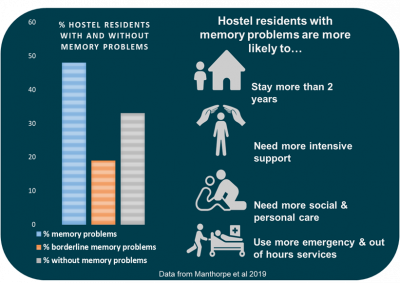HOME
What is the aim of the HOME study?
The HOME study is a five year research project (March 2021 for 60 months) funded by the NIHR. Over the next five years we aim to identify and test ways to support people with memory problems in hostels, facilitating their transition to suitable and settled homes.
Why is this important?
The older homeless population with memory problems is growing, and people who are homeless are likely to have one or more additional vulnerability, such as longstanding physical and mental health problems, drug and alcohol addictions and a history of head injury. Therefore they are more likely, than those who have not been homeless, to have memory loss and other problems in functioning similar to those of people diagnosed with dementia.
We have consulted widely with people experiencing memory problems and homelessness, charities, statutory services, hostel workers and managers. They tell us that people experiencing homelessness and memory problems find it more difficult to accomplish moving from temporary hostels to permanent accommodation than other homeless people, and use more health and social services than those with secure accommodation.

There is little known about how to support this group. We do not know how homeless people with memory problems experience homelessness and how frontline staff support them. It remains unclear how best to support both these groups and this is what we hope to address.
What will we do?
The project will be split into different streams carried out in stages:
- We will start by interviewing a total of 45 people, including homeless people with memory problems, hostel staff and managers; and practitioners working in support services. We will also directly observe staff in hostels supporting older people with memory problems, learning about what currently works and what the challenges are.
- We will then bring together a team of experts by experience (people who have experienced homelessness and memory problems), researchers and people working in related areas to help design the intervention, learning from interviews and observations and what we know already. We expect that the intervention will be delivered to groups of staff, and focus on practical, individualised strategies, supporting staff to: recognise, assess and deliver the help residents aged ≥50 years with memory problems require to move on successfully and manage the challenges that memory problems bring.
- We will try out the intervention in one hostel, making changes based on feedback
- We will complete a study with 40 hostel staff and residents, to see if the intervention is feasible (If hostel staff and residents agree to take part and if we can collect necessary information) and acceptable (if people completed and liked the intervention). We will consider what would be the best outcome measure for a full trial and how to measure how people use services and the intervention cost.
- We will collect information about how the intervention was delivered, how it was received and what people feel should be changed and how if it was useful, it could be rolled out.
What impact will we have?
This research will potentially help those who are homeless, the workforce supporting them and those delivering and commissioning services. If the intervention is feasible and acceptable, We will use the results to design a full randomised controlled trial testing whether it works and is financially feasible to deliver.
We will work with people experiencing homelessness and memory problems in designing the intervention and to guide us in running the project ethically, efficiently and as promised.
 Close
Close




